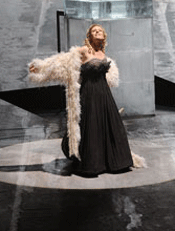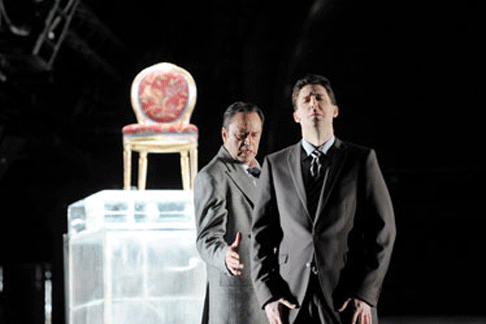Peter Eˆtvˆs seemed to think so, and it was with excitement (tempered by
trepidation) that I took my seat at the wonderful black box space of the
Bockenheimer Depot to witness Frankfurt Opera’s admirable production of
Mr. Eˆtvˆs’ operatic take on the Tony Kushner opus.
Excited because the source material (text adaptation by Mari Mezei) is
generally numbered among the finest US plays of the 20th century, and the
theatrical masterpiece of the 90’s. Apprehensive because the world-famous
seven hour epic was already operatic in its scope and theatricality, and
profoundly rich in its complex and detailed character development. How would it
fare pared down to less than half that length, with the music further slowing
and consuming what remained?
Mr. Eˆtvˆs, a Hungarian composer who has long made France his home, had
widely variable success. It was difficult to know why he chose to have
characters sing certain lines, and simply speak many others, straight out of
the play text. The musicalized prose did not always seem to “sing”
while some of the more poetic expressions ripe for song remained stubbornly
grounded in normal speech.
 Nina Bernsteiner (The Angel)
Nina Bernsteiner (The Angel)
The piece was also clearly conceived to have the singers amplified, and they
sported those head mikes that are the bane of every contemporary musical. While
the sound design was quite fine overall, it has to be said there were (only a
few) moments that the mixing did not flatter the singers. However, given the
expanse of the Depot and the density of the orchestration, mikes were a
grudging necessity.
The orchestrations and instrumental writing were masterful, arguably the
most successful element of the composition. In addition to the usual strings,
brass, and winds, Eˆtvˆs artfully deployed electric keyboards, saxophones and
guitars; unleashed a veritable cornucopia of exotic percussion sounds; and even
cleverly incorporated extra-musical elements like a siren, telephone ring, and
recorded sound effects.
The vocal lines are interwoven with this pleasant wash of sound, but while
they were most usually buoyed by it, they too often competed with it for
interest. While I recall many wonderful instrumental effects, there is really
only a handful of remarkable vocal expressions that I can summon up. This is
not to fault the talented singers, nor is it meant to impugn the
composer’s real skill at setting the text as idiomatic, generally
intelligible American English.
As the drug-addled wife Harper, Jenny Carlstedt gave the performance of the
night. Not only did her acting bring back favorable memories of Marcia Gay
Harden in the show’s Broadway run, but her singing, by turns plangent or
accusatory, was spot on. Doubling as Ethel Rosenberg, she arguably contributed
the show’s most affecting moment in Ethel’s two scenes, sung with
heartfelt, melting tone, and floating her lovely voice over the moaning,
sustained lower string passages. Gorgeous.
Remaining in the “beautiful voice” category, young countertenor
Jeffrey Kim was a revelation in his several roles. While the lowish tessitura
of Mr. Lies’ first scene initially hampered crisp communication of words,
his assumption of the nurse Belize was exceptional. Throughout, he sang with
richness of tone. Peter Marsh, too, contributed handsome, well-schooled
vocalizing as Louis (the tortured character who deserts his AIDS-afflicted
partner). His wonderful lyric tenor was always perfectly placed, his diction
was superb, and his acting was committed and natural. A fine artist.
 Dietrich Volle (Roy Cohn), Nathaniel Webster (Joseph Pitt)
Dietrich Volle (Roy Cohn), Nathaniel Webster (Joseph Pitt)
I also liked Michael McCown in the pivotal role of Prior Walter. He was
personable and engaging, his stage manner unaffected, and his lyric voice had
ping and polish. The role dominates the second act, and the frequent leaps up
to outbursts of exposed high notes did seem to tire him a bit by work’s
end. Still, this was a fine achievement, and his final moments built around the
phrase “more life” were meaningful.
Glamorous Christin-Marie Hill possesses a rich, vibrant instrument which she
used to good effect, most especially as Hannah, Joe Pitt’s Mormon mother.
The crucial role of Joe was taken (sort of) by baritone Nathaniel Webster, whom
I had so enjoyed as Britten’s Tarquinius last season. Sadly, the
indisposed Mr. Webster was unable to sing the role, but rather acted it while
tenor Kent Carlson voiced it from the pit. After a bit of compensatory mugging
at the start, Webster settled down to a nice physical presentation. While Mr.
Carslon’s singing was solid, his speaking voice came across as a bit
effete and high-pitched for this sexually-conflicted Mormon lawyer-husband.
Nina Bersteiner worked so hard as the Angel that I wanted to like her a bit
more than I did. The cruelly difficult range of the role, coupled with broken
phrases and repeated syllabic vocal lines made her efforts at times seem, well,
effortful. When her attractive soubrette was allowed to simply soar, it was a
very enjoyable effect. Dietrich Volle worked hard, too, as Roy Cohn. Too hard,
it seemed. In trying to be every moment “the cursing, vile, dirty
bastard,” Herr Volle spent a lot of time barking vowels, and neglecting
consonants. If you are old enough to remember White Fang’s comic
gruntings on the “Soupy Sales Show” you would have some idea of the
effect. Thankfully, Volle settled down considerably in the second half and his
physical commitment resulted in a compelling death scene.
Forming the Vocal Trio, Anja Fidelia, Diana Schmid, and Leszek Solarski were
just tremendous. They made major contributions throughout the evening, with
flawlessly sung interjections, stylishly tailored phrasing, and superb
background chorals.
Stefanie Pasterkamp’s simple and creative physical production
capitalized on the vast expanses of the Depot by devising a large, steeply
raked stage that mirrored the tiered audience seating, interrupted in the
middle by the pit. White flooring in the center aisle extended through the
musicians and up the center of a divided stage ending in a very steep,
narrowing set of white stairs topped by a high platform.
Stage right had a quasi-excavation site, in the center of which was a
monolithic plastic block of ice, with a richly upholstered chair at its summit.
Stage left was dominated by a hospital bed which hovered menacingly far upstage
until it was required as part of the action. In a startling effect, the nurse
let go of the bed which started plummeting down the slope to the audience until
an unnoticed rope stopped its progress with a violent jerk. The whole stage was
unbounded by masking, legs, or backdrop, creating the effect of an austere
island by capitalizing on the industrial structure of the Depot itself.
Ably abetted by Joachim Klein’s dramatically supportive lighting, Ms.
Pasterkamp also provided character-specific costumes of considerable
imagination and color. The only curious mis-judgment was the glam-girl look for
the Old Rabbi at the top of the piece, with nothing remotely suggesting the
Jewish cleric. It got us off to a rather odd start.
Johannes Erath’s clean stage direction was unfussy, focused, and
efficient. He drew deeply internalized, and strongly felt performances from his
cast. The device of having a naked male extra be the symbolic sexual magnet for
Louis and Joe’s tenuous mating ritual in which they touched the
intermediary as if in physical contact with each other, was poetic and
meaningful. The pairings (and un-pairings) of the characters were supported by
well-considered movement and groupings.
Fantasy scenes happily resisted going over the top. I liked the
“concept” of having the Rabbi, the Angel, and the naked extra
entering from the back of the house through the center aisle, but the reality
of it was that until the characters got toward the very front of the audience,
it was very difficult to turn back and see them. More effective was having the
singers crawl up side ladders from the Depot floor to mount the stage,
furthering a sense of collective improvisation.
A real problem with shearing the play down to libretto proportions is that
much of the sardonic humor of the original text was lost. Well, really, make
that “all.” Mr. Erath managed to inject a few lighter touches into
the evening, such as the sudden appearance of the two garrulous theatre box
denizens from Sesame Street. Otherwise, it was a pretty unrelentingly sober
night about a sober topic.
Another problem with this musical realization is that the dissonant and
disjointed twelve tone sounds are still foreign to most ears. Not unpleasing to
be sure, just unsettling. It took me about a quarter of an hour to become
comfortable with the musical vocabulary. That is not the fault of the truly
excellent conductor, Erik Nielsen who displayed an awesome understanding of the
score, and shaped it with loving skill.
There were AIDS-related displays in the lobby to further underscore the
work’s message, and it seems churlish to criticize the effectiveness of
such a thoughtful piece about a tragedy of such deep concern to all of us.
Sadly, having had the AIDS crisis in our collective consciousness for almost
twenty years now, I fear time has numbed us a bit to the horrors of the plague,
and it has become perceived as a manageable condition rather than the virtual
death sentence it initially was. I applaud all concerned for their diligent
service to this production of Angels in America and for
challenging us to keep engaged with solving this continuing health crisis.
But at the end of the night, it seemed that the audience responded more to
the good intentions and the individual achievements, rather than to any
soul-wrenching dramatic revelations or musical ravishments. While joining Prior
Walter in fervently wishing us all “more life,” I also left wishing
for “more musical drama.”
James Sohre
image=http://www.operatoday.com/Angels_Frankfurt_02.gif
image_description=Jeffrey Kim (Belize, kneeling), Dietrich Volle (Roy Cohn, lying prostrate) [Photo by Monika Rittershaus courtesy of Oper Frankfurt]
product=yes
product_title=Peter Eˆtvˆs: Angels in America
product_by=The Angel/Voice: Nina Bernsteiner; Harper Pitt, Josephs Frau/Ethel Rosenberg/Angel Antarctica: Jenny Carlstedt; Hannah Pitt, Josephs Mutter/Rabbi Chemelwitz/Henry/Angel Asiatica: Christin-Marie Hill; Joseph Pitt/Ghost 2/Angel Europe: Nathaniel Webster / Kent Carlson; Prior Walter, Louis’ Freund: Michael McCown; Louis Ironside, Priors Freund/Angel Oceania: Peter Marsh; Belize, schwarzer Krankenpfleger/Mr. Lies/Woman/Angel Africanii: Jeffrey Kim; Roy Cohn, Rechtsanwalt/Ghost 1/Angel Australia: Dietrich Volle. Oper Frankfurt. Erik Nielsen, conductor. Johannes Erath, director.
product_id=Above: Jeffrey Kim (Belize, kneeling), Dietrich Volle (Roy Cohn, lying prostrate)
All photos by Monika Rittershaus courtesy of Oper Frankfurt